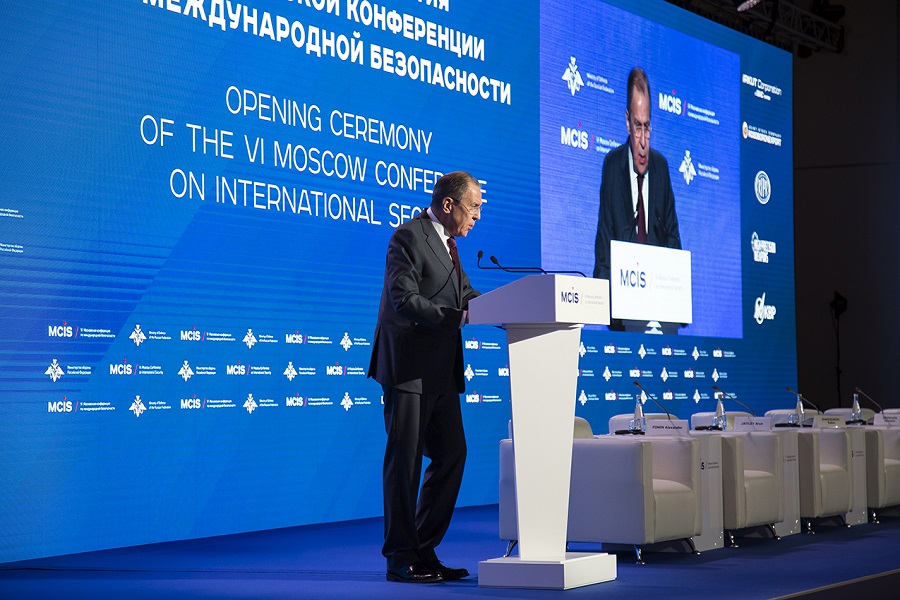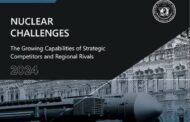Foreign Minister Sergey Lavrov’s remarks at the Sixth Moscow Conference on International Security
Moscow, April 26, 2017
____________________________________________________________________________________________________________________________________
Mr Shoigu,
Colleagues,
Ladies and gentlemen,
Over the past five years, the Defence Ministry’s Conference on International Security in Moscow has become a major part of the academic and practical events on military-political issues held around the world. The high-level representation of participants, which allows for expert dialogue, and the ambitious agenda covering the current key issues provide the grounds for comprehensively analysing current risks and threats and finding solutions for them.
The global situation has neither become more stable nor predictable. On the contrary, we see tension growing both globally and regionally, the continued erosion of international law and attempts to use force to promote unilateral interests, strengthen one’s security at the expense of others’ security and contain the objective development of a polycentric world order at any cost. These actions are damaging our common objective, which is joining our efforts to deal with real rather than imaginary threats.
The upcoming panel discussions at the conference will focus on the struggle against international terrorism, which has grown to an unprecedented scale. For the first time in human history, terrorists want to create their own state, a caliphate with its own territory, population and man-hating ideology. Much is being said at various levels about the need to redouble efforts against this global evil. The Joint Communique of the G7 Foreign Ministers Meeting says that “international cooperation remains of paramount importance in the fight against terrorism.” It further says, I quote: “Countering terrorism and violent extremism and bringing perpetrators to justice remain top priorities for the international community.”
These fine words have been said before, but they have not been turned into reality. However, joint actions and the creation of a broad counterterrorism front, which President of Russia Vladimir Putin proposed at the UN in September 2015, are still being hindered by political ambitions and double standards.
Russia continues working to rally the international community in the fight against terrorism. We have submitted a draft resolution on combating the terrorist ideology to the UN Security Council. We have urged for the introduction of a comprehensive trade and economic embargo on ISIS-controlled territories in keeping with Article 41 of the UN Charter, with sanctions to be imposed on embargo violators.
Adopting the rules of responsible behaviour for states when utilising information and communication technology (ICT) is another important objective. These rules should make it impossible to use ICT for military purposes or interference in internal affairs. The rules must also prevent international terrorists from using ICT. Within the UN, Russia pushes for devising a universal criminal law convention on countering cybercrime.
We will never succeed in our fight against terrorism unless multiple conflicts are resolved, primarily in the Middle East and North Africa. The ceasefire in Syria that was facilitated by Russia, Turkey and Iran in late 2016 and the launch of the Astana process contribute to the intra-Syrian inclusive dialogue.
On the contrary, the recent missile strike by the US against the Shayrat airbase in Syria was a blatant violation of international law and an act of aggression against a sovereign state, which only aggravated the existing problems, making the prospect of building a broad counterterrorist front even more distant and illusive. This begs a comparison with what happened in 2003 in Iraq with the devastating effect on the country and the emergence of ISIS as a direct consequence. I think that there is no need to explain to this audience once more that a dangerous turn of events, including outside the region, could result in ill-advised steps of this kind.
Provocations like the one that took place in Khan Sheikhoun on April 4 call for a professional investigation under the auspices of the Organisation for the Prohibition of Chemical Weapons (OPCW) and following a geographically balanced approach. This should be an open and transparent investigation. We are witnessing attempts to block this process, which only confirms our doubts in the good faith of those trying to exploit the April 4 incident in order to shift the agenda, abandon UN Security Council Resolution 2254 and advance with the long-standing idea of regime change in Syria.
Of course, the surge in terrorist activity should not overshadow other dangerous challenges the world is facing today. The deteriorating situation around the Korean Peninsula is a matter of grave concern as Pyongyang continues its nuclear missile programmes, while the US and its regional allies have disproportionately stepped up their military activity under the pretext of the ‘North Korean threat.’ The accelerated deployment of US THAAD complexes in the south of the peninsula as part of the US global missile defence shield has an especially destabilising effect.
Russia is fully aligned with the consolidated position of the international community regarding Pyongyang’s policy, and reaffirms its commitment to all UN Security Council resolutions. However, it is obvious that the recent emergence of the prospect of using force is fraught with catastrophic consequences for the Korean Peninsula and Northeast Asia in general.
Russia is interested in ensuring security and stability across the Asia-Pacific Region. Having all countries in the region follow the generally accepted rules of behaviour is an essential prerequisite for success, including respecting international law, peaceful settlement of disputes, and non-use of force or threat of force. Russia has proposed to its partners and proactively promotes at East Asia summits concrete measures to build a security and cooperation architecture on a non-bloc and inclusive basis. We see that these efforts are highly relevant. China, India and many ASEAN countries share our approaches. By the way, the fruitful dialogue within the SCO clearly demonstrates that international contacts can be effective, when based on the principles of equality, taking into account each other’s interests and respecting the right of states to choose their own development model.
If we look at another part of the world, the Euro-Atlantic region, one cannot but feel alarmed over its considerable residual conflict potential, which is largely fuelled by NATO’s unilateral actions. Defence Minister Sergey Shoigu has just discussed this in great detail. The unilateral deployment of the US global missile defence system’s European segment is an extremely serious obstacle to strengthening strategic stability. This system is aimed at changing the balance of forces in the area of offensive arms. The deployment of an anti-missile umbrella can bolster the illusions of invulnerability and impunity and tempt one to make unilateral moves while addressing global and regional issues, including lowering the threshold for the use of nuclear weapons. The development of non-nuclear strategic weapons and efforts to prevent the conclusion of an agreement on the non-deployment of weapons in space have a negative impact on international security. The unwillingness or inability of the United States and some other countries to ratify the Comprehensive Nuclear-Test-Ban Treaty (CTBT) gives rise to more and more questions.
We are convinced that it is vital to establish a zone of equal and indivisible security from Vancouver to Vladivostok, as formalised by the decisions of OSCE summits and those of the Russia-NATO Council. More and more Europeans are advocating resumed dialogue in the interests of effectively addressing numerous issues for the purpose of establishing a European security architecture that would involve the Russian Federation.
The resolution of the intra-Ukrainian crisis by completely and consistently implementing the Minsk Package of Measures should help restore mutual trust. Unfortunately, the “war hawks” are gaining the upper hand in Kiev. Armed provocations continue along the demarcation line, as proved by reports of the OSCE Special Monitoring Mission to Ukraine. A blockade imposed against Donbass continues to have a negative impact on this region and the whole of Ukraine. We expect our partners, including our Normandy format partners, to more insistently and openly compel the Kiev authorities to honour their obligations assumed in Minsk.
Colleagues,
The entire world history shows that wars are not unleashed by generals but by politicians, who have special responsibility for maintaining peace and security. Obviously, it is impossible to accomplish successfully global tasks such as the fight against international terrorism, drug trafficking, organised crime and the proliferation of weapons of mass destruction without renouncing the philosophy of hegemony and one’s own exclusivity. It is high time we return to the basic principles of international life formalised in the UN Charter, including the sovereign equality of states, non-interference in domestic affairs and the resolution of disputes by peaceful means.
Russia, jointly with its partners and like-minded countries, will continue to assert solid principles in global affairs and to form the entire new global governance system reflecting the 21st century imperatives. We are ready to work together, jointly search for various options to overcome our challenges on the basis of equality, mutual respect and consideration for each other’s interests. We urge all our partners to do this. Any other road will inevitably lead us all into a dead end.
Thank you and good luck for the rest of your conference.
* * * * *
Zdroj a ilustračné foto: http://www.mid.ru/ru/foreign_policy/news/-/asset_publisher/cKNonkJE02Bw/content/id/2737799?p_p_id=101_INSTANCE_cKNonkJE02Bw&_101_INSTANCE_cKNonkJE02Bw_languageId=en_GB







